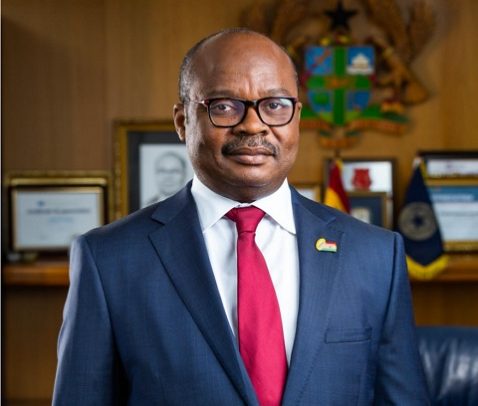Dr. Ernest Addison
AFTER RECORDING an average real gross domestic product (GDP) growth of 3.2 percent in the first half of the year, indications are that growth in Ghana’s economy is firming up.
The Central Bank, which made this known Monday, said this was after economic activity continued to recover beyond the first half of the year.
Dr. Ernest Addison, Governor of the Bank Of Ghana, addressing the 115th press confab in Accra, said in the third quarter, the bank’s high frequency real sector indicators pointed to continued pick-up in economic activity, although at a moderate pace adding that the updated Composite Index of Economic Activity (CIEA) contracted at a lower rate of 0.4 percent in September 2023, compared with a sharper contraction of 1.2 percent in the same period of last year.
“The main indicators that contributed to the relative improvement in the CIEA were industrial consumption of electricity, private sector contributions to Social Security, and tourist arrivals. The momentum in credit to the private sector, cement sales, and port activity, however, slowed down over the period.
“The bank’s confidence surveys conducted in October 2023 reflected emerging positive sentiments about the economy. The Business Confidence Index improved as firms met their short-term targets and expressed optimism about business prospects, while the Consumer Confidence Index remained generally unchanged and stable over the August survey. Also, Ghana’s Purchasing Managers’ Index (PMI) for October 2023 was at 50.5, unchanged from the previous month level,” he noted.
In October 2023, he said headline inflation declined to 35.2 percent, further down from 38.1 percent in September, and 40.1 percent in August 2023 explaining these trends were supported by broad-based deceleration in prices of items in the consumer basket.
“The decline in October’s inflation was driven by both food and non-food prices. Food inflation declined to 44.8 percent in October 2023, from 49.3 percent in September, while non-food inflation eased further to 27.7 percent from 29.3 percent, over the same comparative period.”
Fiscal Policy
Noting that Fiscal Policy Implementation for the first half of the year has been in line with the performance criteria under the IMF ECF-supported programme, he said the targets on the primary fiscal balance on a commitment basis, non-accumulation of external debt payment arrears, and newly collateralised debt by central government and public entities were all attained.
“Fiscal performance based on the narrow budget shows a deficit of 2.9 percent of GDP for the period January through October 2023, against a target of 5.1 percent of GDP.
“The pace of growth in monetary aggregates has significantly slowed, underpinned by tighter liquidity management. Reserve money contracted by 2.6 percent on a year-on-year basis in October 2023 compared to an increase of 62.7 percent recorded for the corresponding period in 2022. The significant contraction in reserve money was on the back of strict adherence to zero financing of the budget and sustained liquidity withdrawal efforts of about GHS44.9 billion (5.3 percent of GDP, year-to-date). As a result of these, broad money supply (M2+) growth declined to 20.4 percent in October 2023, relative to 45.2 percent in October 2022,” he added.
Credit to the private sector contracted during the review period since banks continue to deploy their resources towards short-term investments as opposed to extension of credit, in response to the increased risks associated with lending following the deteriorating macroeconomic conditions and the impact of the Domestic Debt Exchange Programme (DDEP). Private sector credit contracted by 7.5 percent in October 2023, compared with a 57.3 percent growth recorded in October 2022.
“In real terms, credit to the private sector contracted significantly by 31.6 percent relative to a growth of 3.0 percent recorded over the same comparative period.”
BY Samuel Boadi


